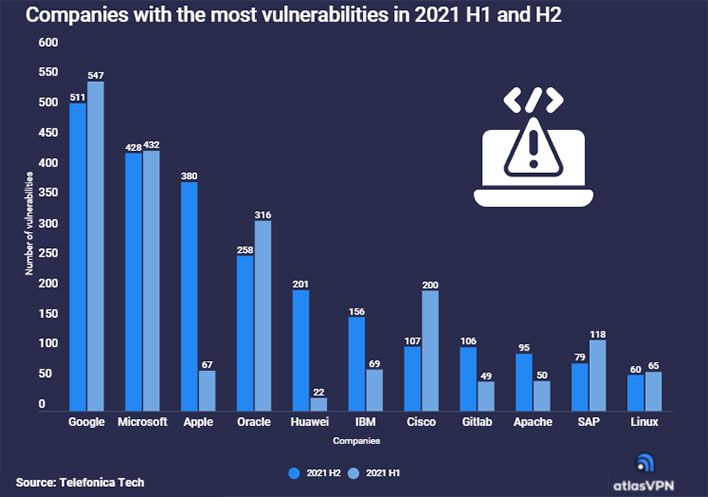Here’s Why Apple Device Vulnerabilities Just Skyrocketed A Startling 467 Percent

Cybercriminals are constantly on the hunt for vulnerabilities to exploit, and over the past six months it seems they've been ramping up their efforts to find weaknesses within Apple's ecosystem. According to a recent security report, the discovery of Apple device vulnerabilities surged a rather shocking 467% from the first half to the second half of 2021.
Only Huawei saw a bigger jump at 814%, which is also a staggering rise, though the total number of vulnerabilities tallied 89% percent higher on Apple devices (380 exploits versus 201). That said, the number of vulnerabilities affecting Microsoft and Google products were much higher than either Apple or Huawei. Here's a look at the breakdown...
Source: Telefonica Tech via AtlasVPN
The folks at AtlasVPN parsed a recent security report put together by Telefonica Tech and plotted the total number of vulnerabilities from several companies, comparing the first and second half of last year. As you can see, Apple was among ones that saw a rise in exploits during the last six months of last year, which put it ahead of Oracle for the third most exploits.
According to AtlasVPN, most of Apple's exploits were found in the company's Safari browser and operating systems across various products. It also pointed out that since a lot of Apple's software is interchangeable and connected, vulnerabilities tend to affect multiple product lines.
That still doesn't explain why Apple's devices saw such a huge surge in vulnerabilities. We reached out to AtlasVPN to see if it had any insight on the matter, and the company's PR manager Vilius Kardelis told us one of the reasons is that many business are seeing an increase in requests to use Apple devices. This suggests more people are moving from Windows to Mac computers. Attackers are "definitely aware" of this trend and are turning their attention to Apple products as a result.
It's not just a supposed shift to Macs with their fancy M1 silicon, though.
"Another reason for the increase in Apple vulnerabilities is that cybersecurity researchers reported numerous significant exploits affecting iPhones and Macs. These include a zero-day arbitrary code execution flaw (CVE-2021-30860) in iOS and macOS that Apple patched in September 2021, which was used to deliver the notorious Pegasus spyware on iPhones and many others," Kardelis said.
He also noted that researchers have been successful in digging up exploits in Apple's technologies, and this in turn has caught the attention of cybercriminals.
"Despite Microsoft and Google products still being targeted the most, attackers are testing Apple's software more occasionally in recent times," Kardelis added.
You can check out AtlasVPN's blog post and Telefonica Tech's security report for more numbers and trends.


